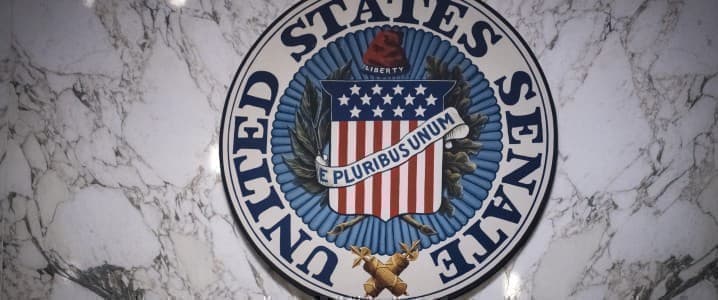U.S. oil and gas companies spent a combined $250 billion in mergers and acquisitions last year. More than half of that came from just two megadeals: Exxon's acquisition of Pioneer Natural Resources and Chevron's takeover of Hess Corp.
The buying spree, according to analysts, was mostly motivated by a drive to secure future production at a relatively low cost while there's cash in the bank after the record-breaking 2022. Analysts have commended the attitude to energy supply security. Congress Democrats, however, have not.
It was only a matter of time before the megadeals—and the smaller deals—of 2023 drew the attention of the wrong people. In this case, the wrong people were a group of 50 Democrats from Congress who this week called on the Federal Trade Commission to investigate the deals.
Led by Senate Majority Leader Chuck Schumer, the group claimed in its letter to the FTC that "Fossil fuel companies have overwhelmingly identified investor pressure as the reason to keep prices high so they can continue to benefit from record profits," continuing with "Americans are paying the price for Big Oil's greed and are still struggling to keep up with gas prices higher than pre-pandemic levels."
To counter this alleged greed grab, the legislators called on the FTC to deepen already existing investigations into some of these deals and launch more, into other deals in the oil and gas space. There was no mention of federal policy aimed at shrinking the industry's growth avenues, such as through lease sales that the current administration—with the blessing of Congress Democrats—significantly curbed.
Related: Two Countries That Could Break Putin's Gas Grip On Europe
Yet federal energy policies were a big reason for the consolidation drive in oil and gas. Those policies increased the financial burden on energy companies with new requirements for emission control and reduction, and they also limited their exploration options by making new exploration too much of a hassle.
Consolidation in a proven producing region, such as the Permian, was a no-brainer, really. So was Chevron's acquisition of Hess that gave it an entry into Guyana's oil boom—unless Exxon prevents the deal from happening by snatching Hess's stake in the Stabroek Block itself.
What's more, some have noted that this consolidation has been positive for the industry's emission footprint. According to Wood Mackenzie, the two deals "add high-margin, low-emissions oil with a long runway, boosting sustainability."
Yet, according to the Democrat group of critics calling on the FTC to investigate deals, "It is now even clearer that there is an anticompetitive pattern developing as Big Oil corporations race to consolidate the Permian Basin and other key American oil fields, and the FTC must take this pattern into account as it assesses each individual transaction."
Consolidation could indeed lead to questionable outcomes for consumers if it results in a very small minority of companies operating in one field. Amazon, for instance, hardly has any meaningful competition after it bought all potential challengers. Google is an undisputable dominant force online and so are Facebook and Microsoft. Big Tech is a very small world, if you think about it. Yet Big Tech does not garner anywhere near the same level of concerned interest from Democratic legislators.
The oil industry, on the other hand, is a favorite target for the current crop of legislators in Congress. Given that this is an election year and the Democrats already have their key voter groups in their sights, chances are there will be more legislative attacks on oil and gas in the coming months, even if those FTC investigations uncover nothing more than one company buying another to improve its long-term chances of survival and profitability in the absence of any viable paths to that.
Then, there is the awkward aspect of emission reduction. While the letter-writing legislators made no mention of this in their letter, the Secretary of Energy did. Speaking to Axios, as quoted by Reuters, Jennifer Granholm noted that consolidation could help speed up the oil industry's decarbonization efforts.
"Many of the majors, many of them not all ... have been taking action on climate and clean energy and a lot of the folks who are small level producers were not as interested, or didn't have the resources to address (those issues) so I'm encouraged that there seems to be a movement in this direction," Granholm said.
That the Democrats were going to have things to say about the wave of M&A activity in oil and gas was a given. That they would seek to interfere with the industry consolidation was also a given. A third given was that they would not acknowledge their own role in limiting the industry's growth options to consolidation and international expansion. None of what has happened so far has been a surprise.
What happens now would be more interesting, however. The FTC could be used as a tool to try and stop some of the deals, with the focus no doubt on the Exxon-Pioneer and Chevron-Hess tie-ups. Believing that such a development would result in lower gasoline prices for Americans is not simply naïve but dangerous. Because it would likely result in the opposite. Just because there are more companies in the field doesn't mean they can't act in concert.
By Irina Slav for Oilprice.com
More Top Reads From Oilprice.com:
- This Could Be A Gamechanger For Natural Gas In Europe
- Oil Prices May Yet End the Week on a High Note
- U.S. Seeks Semiconductor Supremacy with New Funding Initiatives


















«Because it would likely result in the opposite. Just because there are more companies in the field doesn't mean they can't act in concert.» Or is that a type of concert like where everyone is trying to play the same tune?